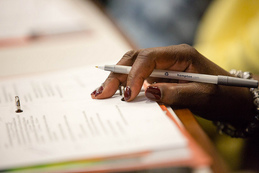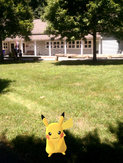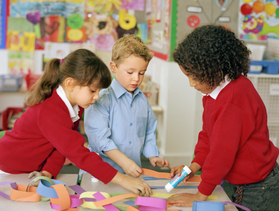 Fill 'er up! Fill 'er up! Well, the topic for K is a little disappointing for me. The word 'knowledge' doesn't make the right sound at the beginning of the word! It just doesn't sound the way I want it to: K for a word that starts with an 'N' sound. Darn you English language! Ok, now that the incredibly nerdy side of me has gotten that out of my system, we can talk about knowledge. Because correct beginning sound or not, it's an important part of cultural competence. In fact, most definitions of cultural competence include something about having knowledge of different cultures (awareness, skills, behaviors, attitudes are also often thrown in there). So possessing knowledge about other cultures is absolutely vital. It's important to keep in mind that having knowledge about every culture is pretty much impossible. You are never going to know everything about everyone around the world. But it's always something that you strive for. In several previous posts (I'm loving B, C, & G) I talked about how to increase cultural knowledge while having fun with your kids. There will be even more suggestions in upcoming posts (letters M & P are favorites of mine). So in this one, I thought I'd focus on the grown-ups for a change and offer some adult book suggestions for how to increase your cultural competence knowledge. If you have teens or young adults at home then they may also be able to read these with you:
Which one will you get first? Have you read any of these? What did you think? Do you have additional suggestions for adult books? Leave a comment below. Don't forget to check back next week for letter L! Better yet sign up for our newsletter and it'll be delivered right to your inbox!
1 Comment
 Get it all out. Write it all down. Get it all out. Write it all down. This post is for all of you out there that have an introspective kid at home. That kid who is often really quiet and then asks the most amazingly insightful questions - ones that you can't possibly begin to answer. Questions like: "How do you know there is no such thing as monsters if you've never seen them?" or "Do people and animals all go to the same place when they die even if they don't get along?" or the ever-popular "Where do we come from?" Seriously? How did all of that brilliance just come out of my child's mouth?!? Some kids are just incredibly reflective and express themselves best when they write down their thoughts. If you have a kid that is creative, you can encourage them to make sense of the diversity in their world by journaling about it. It can be something that they share with you or something private that is only for them. Whatever your child prefers, you should respect. But be sure to let them know that you're there to talk if they ever want to. Below are some journaling suggestions (you don't have to write anymore! There are lots of alternative options) and some ways for your child to get started. You can suggest these to your kid, but don't force it (especially if you have a teenager at home - that's a surefire way to make sure it'll never happen). Let them know that this is a creative option that they might want to try and let their imagination flow from there. Who knows, they may come up with something that is much cooler than you or I could ever imagine! Ways to Journal:
Journal Topics:
Leave a comment and let us know what you might suggest to your child and what he or she may journal about. Did you kid share with you or do it privately? Let us know! Did you enjoy this post? Check back next week for letter K! Better yet, sign up for the newsletter so you don't have to remember to check. Get valuable tips & tricks and all the latest from Culturally Competent Kids!  I found you Pikachu! I found you Pikachu! It's official. Pokémon Go is the newest nationwide obsession. People are glued to their phones, trying to capture as many Pokémon as humanly possible. Diversity issues have captured the nation's attention as well, but for very different - and tragic - reasons. The shooting at the Orlando nightclub, the deaths of Black men at the hands of police officers, and the sniper attack of 5 Dallas police officers have left Americans reeling. These recent events are overwhelming for many and perhaps that is part of the reason Pokémon Go is so popular. At a time when so much of the news is bad news, it's nice to have some kind of escape. But you can do both - enjoy Pokémon Go and learn about diversity. In fact, both are great activities to do alone or with others - especially kids. Read on and discover what they have in common (it's more than you think!).
But there is one caveat; one way in which Pokémon Go is very different from diversity: Pokémon Go isn't real. The discrimination and oppression that minorities deal with on a daily basis is very, very real. Yes, Black men get shot and killed. Yes, women get sexually assaulted while they are unconscious. Yes, LGBTQ young people are subject to bullying at an astonishingly high rate. That is not augmented reality. It's not virtual reality. Those are simply the facts. Don't shy away from learning about diversity. It can be surprisingly fun and I highly encourage that you do it with your kids. And unlike video games, which come and go, diversity is here to stay. So embrace it all - the initial learning, the updates, the technical errors. In the end, the payoff is always worth it. Did you enjoy this post? Sign up for our newsletter! Instead of having to remember to check out the blog, you will get great information delivered right to your email. Tips, strategies, articles, and videos so you know that you're not alone! When you sign up, you will receive a useful diverse book list for kids of all ages-babies to young adults. Enjoy!  I really like this particular letter because it's all about getting up close and personal. It's great to talk about people who are different than you, but one thing that is truly effective in changing hearts, minds, and attitudes is interacting with people who are different. Why is this the case? Well, when you interact with and get to know people who are different than you, they can help to debunk the myths that can be held about a group that they belong to. Think all Muslims are terrorists? Not my friend from school and her family. All Black people are violent? Not the nice man from my church who always gives me candy (this is actually something that happens at my church - one man gives my kids candy every weekend. They LOVE him - clearly!). All gay people are promiscuous? Not our family friend who has been in a committed and monogamous relationship with his boyfriend for the past 8 years. Without these interactions, it can be harder (not impossible, but much more difficult) to understand that stereotypes aren't applicable to everyone. This can be especially helpful for children, who need something concrete, rather than hypothetical, to really internalize that. Or better yet, interactions can help prevent stereotypes from developing and solidifying in children's brains to begin with. There is a caveat to this, however. The interaction has to be authentic. It can't be forced or just for show. Kids will see right through that. And they are going to look to you as the adult to set the tone. So if you always say hello to the mom at school who is a different color than you, but are actually friends with moms who are of your same race, that sends a powerful message to a child. Kids are smart - they know the difference! Encourage your child to interact with people who are different, but follow your own advice as well. Here are some ideas to get you started:
Which one will you try first? Which is the easiest? Any additional suggestions on ways to reach out? Leave a comment below so we can all benefit from your great ideas! Did you enjoy this blog post? Don't miss another one by signing up for the newsletter! You will get the latest from Culturally Competent Kids so you don't have to remember to check. Enjoy!  There is beauty in all holidays There is beauty in all holidays Who doesn't love a good holiday?? It's a time to spend with family, engage in traditions, and oftentimes stuff yourself with your favorite foods. Here in the US, our time off from work and school is centered around Christian holidays. We always have Christmas off and we frequently don't go to school right before or after Easter. There are also holidays that are distinctly American such as Thanksgiving, Fourth of July, and holidays that don't mean a day off from school, but are expected to be celebrated (Valentine's Day, Mother's Day, Father's Day). However, not all people celebrate holidays in the same way. One of the tenants that the United States was founded on is freedom of religion. Although not as much attention is paid to some religions, there are many here in the US. And each religion has its own holidays and own celebrations. Use this to do an activity with your child. There are lots of ways to use holidays to learn about other religions. Here are some suggestions. Choose your favorite or try all of them! Or better yet, let your child pick what would be fun and interesting to them:
Which activities will you try with your kids? Which sound like the most fun? Were there any religions that you didn't know about at all? Did you find a new tradition that you love? Leave a comment below. Don't forget to check back next week to for the next letter - I! Or even better, sign up for the newsletter and you won't miss a post! |
AuthorDr. Sweeney is a licensed school psychologist and cultural competence expert. Here are her musings on life in a multicultural world. Archives
February 2017
CategoriesInterested in writing a guest blog post? Contact me for more information!
|
Proudly powered by Weebly
 RSS Feed
RSS Feed